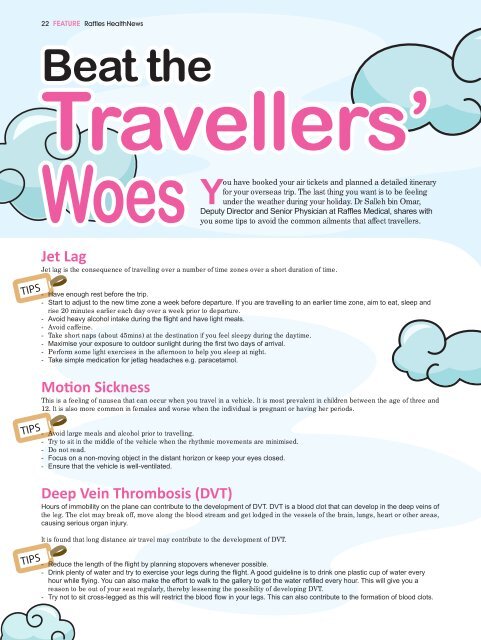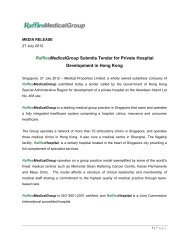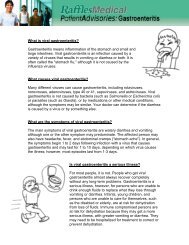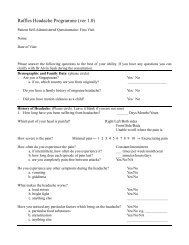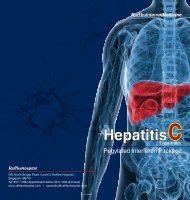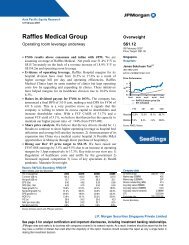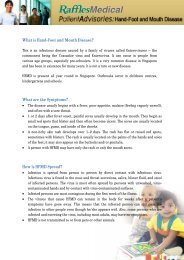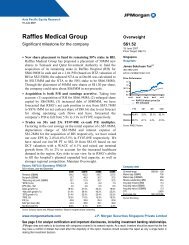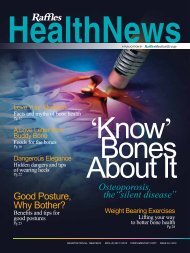REGISTRATION No. 198901967K MICA (P) - Raffles Medical Group
REGISTRATION No. 198901967K MICA (P) - Raffles Medical Group
REGISTRATION No. 198901967K MICA (P) - Raffles Medical Group
You also want an ePaper? Increase the reach of your titles
YUMPU automatically turns print PDFs into web optimized ePapers that Google loves.
22 Feature <strong>Raffles</strong> HealthNews<br />
Beat the<br />
Travellers’<br />
Woes<br />
You have booked your air tickets and planned a detailed itinerary<br />
for your overseas trip. The last thing you want is to be feeling<br />
under the weather during your holiday. Dr Salleh bin Omar,<br />
Deputy Director and Senior Physician at <strong>Raffles</strong> <strong>Medical</strong>, shares with<br />
you some tips to avoid the common ailments that affect travellers.<br />
Jet Lag<br />
Jet lag is the consequence of travelling over a number of time zones over a short duration of time.<br />
-<br />
-<br />
-<br />
-<br />
-<br />
-<br />
-<br />
-<br />
Have enough rest before the trip.<br />
Start to adjust to the new time zone a week before departure. If you are travelling to an earlier time zone, aim to eat, sleep and<br />
rise 20 minutes earlier each day over a week prior to departure.<br />
Avoid heavy alcohol intake during the flight and have light meals.<br />
Avoid caffeine.<br />
Take short naps (about 45mins) at the destination if you feel sleepy during the daytime.<br />
Maximise your exposure to outdoor sunlight during the first two days of arrival.<br />
Perform some light exercises in the afternoon to help you sleep at night.<br />
Take simple medication for jetlag headaches e.g. paracetamol.<br />
Motion Sickness<br />
This is a feeling of nausea that can occur when you travel in a vehicle. It is most prevalent in children between the age of three and<br />
12. It is also more common in females and worse when the individual is pregnant or having her periods.<br />
-<br />
-<br />
-<br />
-<br />
-<br />
Avoid large meals and alcohol prior to travelling.<br />
Try to sit in the middle of the vehicle when the rhythmic movements are minimised.<br />
Do not read.<br />
Focus on a non-moving object in the distant horizon or keep your eyes closed.<br />
Ensure that the vehicle is well-ventilated.<br />
Deep Vein Thrombosis (DVT)<br />
Hours of immobility on the plane can contribute to the development of DVT. DVT is a blood clot that can develop in the deep veins of<br />
the leg. The clot may break off, move along the blood stream and get lodged in the vessels of the brain, lungs, heart or other areas,<br />
causing serious organ injury.<br />
It is found that long distance air travel may contribute to the development of DVT.<br />
-<br />
-<br />
-<br />
Reduce the length of the flight by planning stopovers whenever possible.<br />
Drink plenty of water and try to exercise your legs during the flight. A good guideline is to drink one plastic cup of water every<br />
hour while flying. You can also make the effort to walk to the gallery to get the water refilled every hour. This will give you a<br />
reason to be out of your seat regularly, thereby lessening the possibility of developing DVT.<br />
Try not to sit cross-legged as this will restrict the blood flow in your legs. This can also contribute to the formation of blood clots.


